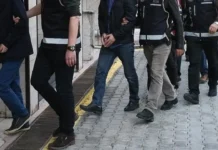Turkish human rights activists on Wednesday took to the social media platform X to draw attention to Yusuf Bilge Tunç, a former public sector worker who was reported missing under suspicious circumstances in August 2019.
Posting under the tagline “Yusuf Bilge missing for five years,” the activists called on Turkish authorities to determine the whereabouts of the civil servant, widely feared to be another victim of a series of alleged enforced disappearances in the country since a failed coup in July 2016.
The posts highlighted the suspicious circumstances surrounding Tunç’s disappearance, such as the finding of his car near a busy shopping mall in the capital city of Ankara and the authorities’ reluctance to investigate, which delayed the crime scene investigation on the vehicle by six months.
“He has a spouse, children, parents and siblings looking for his return,” tweeted journalist Hasan Cücük, who joined the campaign. “Let this constant suffering end.”
Journalist Sevinç Özarslan reposted the video of a 2021 interview with Tunç’s sister, Şefika Nur Kurt, who said, “I think my brother might be dead, but I still try to remain hopeful since he doesn’t have a grave yet.”
To the dismay of rights groups, the European Court of Human Rights in March 2022 rejected the family’s application accusing the Turkish government of failing to carry out an effective investigation into the disappearance.
Later that year the UN Human Rights Committee accepted an application concerning Tunç’s disappearance, requesting further information from Ankara about the case.
Tunç is one of the nearly three dozen people who went missing under suspicious circumstances after the July 2016 attempted coup.
Several reports have identified patterns characterizing the disappearances, such as the fact that most victims were people who were either under investigation for or convicted of alleged links to the Gülen movement, a faith-based group targeted by the government.
In most cases, the police and the prosecutors were reluctant to investigate, despite eyewitness accounts and video footage gathered by family members who took matters into their own hands.
Some victims turned up in police custody months after they were reported missing, with their families reporting visible physical and mental weakening, while others, such as Tunç, still remain unaccounted for.
Turkish President Recep Tayyip Erdoğan has been targeting followers of the Gülen movement since the corruption investigations of December 2013, which implicated then-prime minister Erdoğan, his family members and his inner circle.
Dismissing the investigations as a Gülenist coup and conspiracy against his government, Erdoğan designated the Gülen movement as a terrorist organization and began to target its members. Erdoğan intensified the crackdown on the movement following the 2016 coup attempt that he accused Gülen of masterminding. Gülen and the movement strongly deny involvement in the abortive putsch or any terrorist activity.
Some investigative journalists have claimed that the Turkish intelligence is operating a black site in Ankara where the abductees are held in incommunicado detention, interrogated under torture and coerced into becoming informants for the state.
Turkey also has a history of enforced disappearances before the 2016 coup, particularly in the 1980s and 90s when more than 1,000 people disappeared while in police custody.
Family members of the victims have formed the Saturday Mothers, the country’s longest-running civil protest movement which gathers for weekly vigils in İstanbul’s historic Galatasaray Square to ask for accountability. Their sit-ins are often violently dispersed by the police and many members of the group have stood trial due to their attendance.















